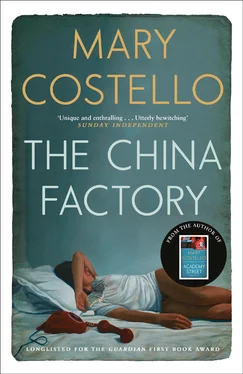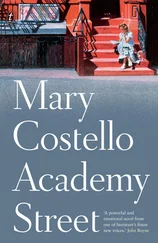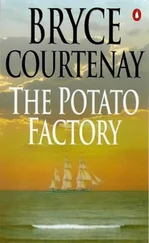Mary Costello - The China Factory
Здесь есть возможность читать онлайн «Mary Costello - The China Factory» весь текст электронной книги совершенно бесплатно (целиком полную версию без сокращений). В некоторых случаях можно слушать аудио, скачать через торрент в формате fb2 и присутствует краткое содержание. Год выпуска: 2015, Издательство: Canongate Books, Жанр: Современная проза, на английском языке. Описание произведения, (предисловие) а так же отзывы посетителей доступны на портале библиотеки ЛибКат.
- Название:The China Factory
- Автор:
- Издательство:Canongate Books
- Жанр:
- Год:2015
- ISBN:нет данных
- Рейтинг книги:5 / 5. Голосов: 1
-
Избранное:Добавить в избранное
- Отзывы:
-
Ваша оценка:
- 100
- 1
- 2
- 3
- 4
- 5
The China Factory: краткое содержание, описание и аннотация
Предлагаем к чтению аннотацию, описание, краткое содержание или предисловие (зависит от того, что написал сам автор книги «The China Factory»). Если вы не нашли необходимую информацию о книге — напишите в комментариях, мы постараемся отыскать её.
In these twelve haunting stories award-winning writer Mary Costello examines the passions and perils of everyday life with startling insight, casting a light into the darkest corners of the human heart.
The China Factory — читать онлайн бесплатно полную книгу (весь текст) целиком
Ниже представлен текст книги, разбитый по страницам. Система сохранения места последней прочитанной страницы, позволяет с удобством читать онлайн бесплатно книгу «The China Factory», без необходимости каждый раз заново искать на чём Вы остановились. Поставьте закладку, и сможете в любой момент перейти на страницу, на которой закончили чтение.
Интервал:
Закладка:
Her mother’s home was called Easterfield. She remembers it from when she was very small, a big house with tall windows and a wide lawn facing the wrong way — facing out to the fields instead of to the road — and a gravel yard with barns where her father parked the car. And upstairs long landings with creaking floorboards and rooms with no light bulbs, and the creepy backstairs at the far end. She has a faint memory of her mother’s father with snow-white hair and round glasses sitting by the range holding a red plastic back scratcher in his hand. The house is all closed up now. On the day of her mother’s fourth birthday a blackbird flew into the dining room and tore a piece of wallpaper from a spot above the window. The wallpaper had swirling ivy and serpents, and was very old. She sees her four-year-old mother standing in the room looking up at the blackbird. Suddenly her thoughts turn dark. She is getting too close to the sadness of her mother’s life.
At home her father and her older brother are gathering in the sheep and lambs and flocking them in the yard, for dosing. She hates when there are big jobs going on. The night before the sheep-shearing or silage-making or cattle-testing she cannot sleep. She lies there, rehearsing it all in her mind, searching for dangers — open gates, charging cattle, escaping children — or the rage of her father when an animal breaks loose or the baler breaks down. By morning she is exhausted, and all day long she keeps watch. She is not as quick at the farm work as her brother and sister — at turning the turf or stacking the bales — and she is relieved when evening comes. She is always waiting for evenings and happy endings.
In the yard her father and her brother make hooshing sounds at the sheep and Captain the sheepdog rushes in and nips them on the legs. When they are penned tightly she looks in through the rungs of the gate at the ewes’ big faces. They look calmly back at her. She has the feeling that they know more than she does and that, somehow, like her mother, they understand her. And maybe even love her.
One day when she was seven she turned to her mother, smiling, and said, What was your mammy like? Her mother stopped for a second.
— I never knew my mother, she said. She died when I was three. A week later the bird flew in and tore the wallpaper in the dining room.
The mother was in bed, coughing, for a long time and her mother’s older sisters came home from boarding school to mind her and their baby brother. Her mother remembers being lifted up on the bed to give her mother a kiss.
— She had a white nightdress on and long hair. I put out my hand to touch her hair but they must have thought I was going to pull it so they lifted me down and took me away.
She wanted to say something but she was afraid she would make her mother cry.
— She told my sisters which dress to lay her out in. And to be sure to use the linen tablecloth for the meal after the funeral. I remember the men carrying the coffin down the stairs.
Her mother stands on the steps at the front door and calls her in. In the kitchen her grandmother is sitting by the range knitting. She tells her to take the brush and sweep the floor. Afterwards she plays with her small sister and brother on the floor. Her other sister, who is eight and the middle child, is cutting out cardboard shapes with scissors that are too big for her hands. Her mother is making bread at the kitchen table, and every now and then turns to check the steaming saucepans on the cooker. Her mother is always working, inside and out — putting down fires, making meals, bringing in turf. She is always tired. Sometimes at Mass she falls asleep and she or her sister has to wake her up to stand for the prayers. The work is never done. Every week brings new jobs on the farm. She tries to see ahead and help her mother — she hoovers the house on Sunday mornings before Mass and stuffs the chicken and sews up its behind with a needle and thread, the way her grandmother taught her.
It is not her father’s fault, all this work — he is tired too. But at night when he sits down to watch television, her mother is still at the cooker frying the tea, or at the table making apple tarts, or ironing, and the television is blaring and the kitchen is hot and the younger kids are arguing and fighting. Sometimes her mother snaps at her father and her father snaps back and her grandmother tells the kids crossly to have manners and then her mother cries. One winter’s night her mother flung a plate of rashers and sausages down on the table in front of her father and ran out of the kitchen. The food bounced on the plate. She followed her mother into the hall, begging her, but her mother put on her purple coat and walked out the front door. She ran after her, pulling at the coat, crying Come back, but her mother ran down the steps, and off into the night. She stood at the open door not knowing which way to turn. She thought she should be loyal to her mother but the little ones were crying in the kitchen. She ran in to her father. She’s gone, she cried. Are you happy now? His face was dark and lonely. She remembered that look on him before, when she woke one night and came down for a drink, and he was sitting in the armchair watching a film. Go after her, she said softly, you have to go after her. But he just sat there, sad and silent. When the kids were fed she stood at the front door again looking out into the dark. Her heart was shattered. Then her grandmother called her in. An hour later she heard the front door close quietly and her mother’s footsteps on the stairs. Later when she went up to her own room her mother was in her bed. She put her arms around her and kissed the top of her head. Her mother only ever kisses her when she is sad. She thought her mother must have walked to the end of the lane, and might have kept going if the lane hadn’t ended.
*
The dinner is ready and she goes outside and calls down to her father and brother in the yard. Her brother is inside the pen, holding a lamb like a baby in his arms, its legs in the air. She knows that sometimes they are happy, the whole family is happy. Some mornings when they are at the breakfast and her mother is standing by her father’s side pouring out his tea he touches her waist and she sees the look they give each other. Last winter when her grandmother went on holidays to an uncle’s house, her father carried the record player out to the kitchen every night and put on Jim Reeves, and taught herself and her sister to dance. He lifted them, in turn, onto his stockinged feet and waltzed them around the floor. When they were finished she said to him, Dance with Mammy, and she ran and tugged on her mother’s arm. But her mother was tired. She was sewing buttons on a jacket. Her father stayed standing in the middle of the kitchen for a minute with his arms by his side, staring at the tiles.
At the dinner table an argument starts and her middle sister grabs a crayon from her small brother’s hand and he starts to bawl. Give it back to him, her mother tells her. It’s mine, her sister says. She doesn’t care. She gives backchat to her mother and father all the time. To her grandmother too. Her mother is cutting open an apple tart now. Sometimes she is helpless; she does not know what to do or how to be a mother. She gives her sister a look across the table but her sister is defiant. The little brother thumps her sister and she thumps him back, harder, and her father shouts at her. Her grandmother says, That’s the family ye’re rearing now. Her sister looks across at her grandmother. Shut up, you, she says. Her heart is pounding and she kicks her sister under the table to make her stop. But her sister keeps on going. Then as her grandmother turns to get up from the table her mother reaches across and slaps her sister on the elbow with the tip of the bread knife. Her sister’s mouth falls open and she howls. Blood falls from her elbow onto her plate. Her mother has a terrified look and she jumps up and runs to the sink. Her father’s face darkens and his mouth clenches in anger. She expects he will pound the table with his fist and knock over the chair and storm out. But he doesn’t move. He is staring at her mother. They are all staring at her mother, and at the big drops of blood falling on the plate. She doesn’t feel sorry for her sister at all — her heart is raging at her sister.
Читать дальшеИнтервал:
Закладка:
Похожие книги на «The China Factory»
Представляем Вашему вниманию похожие книги на «The China Factory» списком для выбора. Мы отобрали схожую по названию и смыслу литературу в надежде предоставить читателям больше вариантов отыскать новые, интересные, ещё непрочитанные произведения.
Обсуждение, отзывы о книге «The China Factory» и просто собственные мнения читателей. Оставьте ваши комментарии, напишите, что Вы думаете о произведении, его смысле или главных героях. Укажите что конкретно понравилось, а что нет, и почему Вы так считаете.












